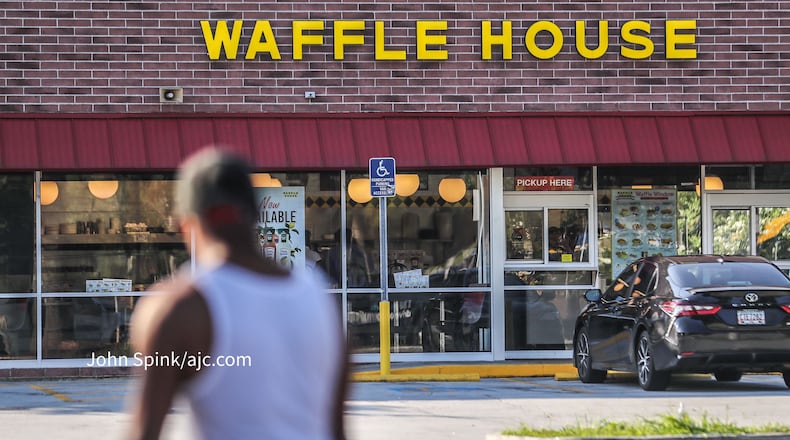It looks and feels like a long-odds, union organizing drive.
Workers, coordinated by a union, are holding rallies, signing petitions and making demands for higher wages, better safety and improved work conditions at the nearly 2,000 locations operated by Norcross-based Waffle House across dozens of states in the South and Midwest.
But no one is talking about getting workers to vote on a union at Waffle House. At least not yet.
Typically, a union drive aims to raise enough support to trigger federal law that requires a vote of workers. Sometimes in particular locations, sometimes across an entire company.
This is a different kind of campaign, said Inez O’Donnell, spokesperson and organizer for the Union of Southern Service Workers, an affiliate of the national Service Employees International Union. “We are in the South and the law is not friendly to workers, and we are trying to counteract that.”
A spokeswoman for Waffle House declined comment.
The Waffle House campaign does follow several years of growing union action, some of it successful, including high-profile national contracts with American automakers, the film industry, American Airlines and Kaiser Permanente, as well as Georgia wins among grad students at Emory, truck drivers at Georgia Tech, bus-maker Bluebird, and about a half-dozen Starbucks locations.
There have been failures, too, including rejection of a union at a hip Athens brewery. At the same time, legislators in Georgia — where laws already tilt against unions — are now pushing a bill that would further crimp efforts at organizing.
With Waffle House, an effort just aimed at a vote would have been wasted, said O’Donnell. “We have definitely gotten more results than if we had tried to do that. We’ve got people jobs back, gotten people restitution of wage theft.”
Moreover, winning a union vote is only a step toward a better contract.
Starbucks Workers United has won votes in about 360 different locations, including about a half-dozen in Georgia, but has yet to negotiate a contract with the company in any of them.
In contrast, the USSW, which says it has about 4,000 members, pulls together workers from hotels, restaurants, gas stations and other service jobs as a kind of chorus to amplify complaints from Waffle House workers.
The way organizers see it, organizing the entire company would require far more resources than they have. They also worry that trying to pick off individual Waffle House locations could also be a doomed strategy.
Each restaurant has a relatively small number of employees and many have rapid turnover. That means fewer people have long-term ties, knowledge and camaraderie, but it also lets employers challenge a successful vote just months later if there are enough new employees.
So the USSW’s plan is to raise public awareness — hence, the rallies — while engaging ever-more Waffle House employees and creating both inside and outside pressure on the company to make changes.
There are plenty of ways to answer worker complaints without recognizing a union, said Cindy Smith, 50, who has been a waitress at Waffle House for 29 years, mostly in Conyers.
Better pay, for example.
“I love my job, I love what I do,” she said. “But if I was making more, I could afford to live on my own. I have to live with my kid’s father. I get $2.92 an hour, plus tips. If there’s nothing going on, you are not making any money.”
Workers also want better security at the always-open restaurant. Smith has been held up at gunpoint, and many workers talk about the times they’ve seen violence or the threat of it.
Jojo Dickson, who worked at Waffle House until a few months ago said health conditions can also be a problem.
“We have to clean up feces,” she said. “People throw up in cups and we don’t get paid enough to clean it up.”
Kavionna Harmon, 24, recently left Waffle House after working there for four years.
“I work now at Wendy’s,” she said. “That’s better.”
The Waffle House campaign is smart not to focus on a union vote, said Kate Bronfenbrenner, a senior lecturer at Cornell’s School of Industrial and Labor Relations.
“They are building unions in a very hostile environment,” she said. “So they do it by focusing on issues that resonate with the workers. Wages, safety, benefits, access to childcare, access to training.”
Either way, it’s an uphill battle, said Dan Bowling, former corporate attorney and now a visiting law professor at Georgia State University.
He compared it to the “Fight for $15″ movement that pressured McDonald’s to raise pay in many restaurants without ever negotiating with any union.
“It’s a long, difficult road to get a union and a contract,” he said. “This is more about public awareness, getting the company’s attention and getting some things to change.”
Keep Reading
The Latest
Featured



